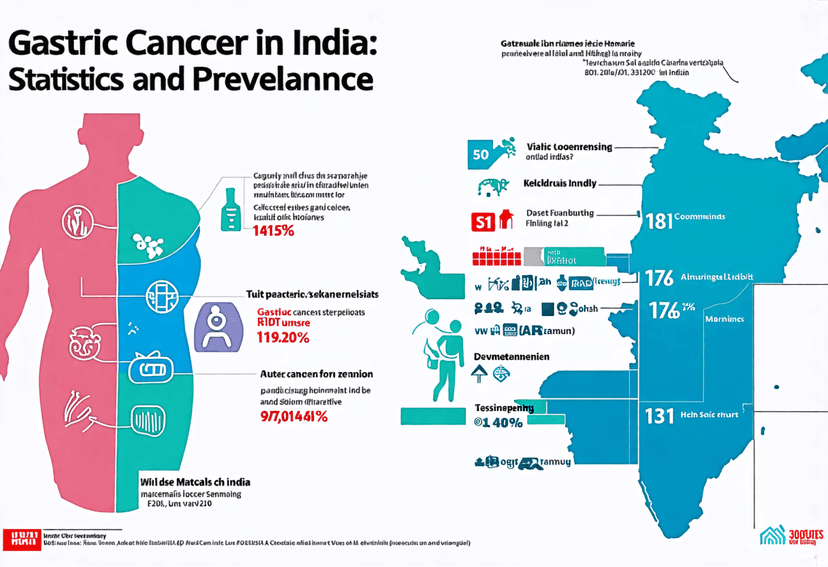
Gastric Cancer Prognosis: Life Expectancy and Outlook
18 Oct, 2024
 Healthtrip
HealthtripWhen a person is diagnosed with gastric cancer, one of the first questions that come to mind is, "What's the prognosis?" Understanding the life expectancy and outlook for gastric cancer can be a daunting task, but having a clear picture can help patients and their loved ones prepare for the road ahead. In this article, we'll delve into the world of gastric cancer prognosis, exploring the factors that influence life expectancy and what patients can expect during their journey.
Understanding Gastric Cancer Prognosis
Gastric cancer, also known as stomach cancer, is a type of cancer that affects the stomach lining. The prognosis for gastric cancer varies greatly depending on several factors, including the stage of cancer, the location of the tumor, and the patient's overall health. Generally, the earlier the cancer is detected, the better the prognosis. When caught in its early stages, gastric cancer can be treated effectively, and patients can expect a good quality of life. However, if the cancer has spread to other parts of the body, the prognosis is typically poorer.
Most popular procedures in India
Factors Affecting Gastric Cancer Prognosis
Several factors can influence a patient's prognosis, including:
The stage of cancer: The stage of cancer refers to how far the cancer has spread. There are four stages of gastric cancer, with stage 1 being the earliest and stage 4 being the most advanced. Patients with stage 1 cancer have a much better prognosis than those with stage 4 cancer.
Wellness Treatments
Give yourself the time to relax
Lowest Prices Guaranteed!

Lowest Prices Guaranteed!
The location of the tumor: Tumors located in the upper part of the stomach have a better prognosis than those located in the lower part of the stomach.
The patient's overall health: Patients with underlying health conditions, such as heart disease or diabetes, may have a poorer prognosis than those who are otherwise healthy.
The type of cancer: There are several types of gastric cancer, including adenocarcinoma, lymphoma, and squamous cell carcinoma. Adenocarcinoma is the most common type and has a poorer prognosis than the other types.
Gastric Cancer Life Expectancy
The life expectancy for patients with gastric cancer varies greatly depending on the stage of cancer and the patient's overall health. According to the American Cancer Society, the 5-year survival rate for patients with stage 1 gastric cancer is around 65%. For patients with stage 4 gastric cancer, the 5-year survival rate is around 5%.
Here are some general statistics on gastric cancer life expectancy:
Stage 1: 65% 5-year survival rate, with a median survival time of 5-7 years
Stage 2: 30-40% 5-year survival rate, with a median survival time of 2-4 years
Stage 3: 10-20% 5-year survival rate, with a median survival time of 1-2 years
Stage 4: 5% 5-year survival rate, with a median survival time of 6-12 months
Treatment Options and Life Expectancy
Treatment options for gastric cancer include surgery, chemotherapy, and radiation therapy. The choice of treatment depends on the stage of cancer, the location of the tumor, and the patient's overall health. Patients who undergo surgery have a better prognosis than those who do not.
Surgery: Surgery can improve the 5-year survival rate by up to 20%.
Chemotherapy: Chemotherapy can improve the 5-year survival rate by up to 10%.
Radiation therapy: Radiation therapy can improve the 5-year survival rate by up to 5%.
Coping with Gastric Cancer Prognosis
Receiving a diagnosis of gastric cancer can be overwhelming, and understanding the prognosis can be daunting. However, it's essential to remember that every patient is unique, and the prognosis can vary greatly. Patients should focus on staying positive, seeking support from loved ones, and working closely with their healthcare team to develop a treatment plan that's tailored to their needs.
It's also essential to remember that gastric cancer prognosis is not a prediction of the future. Many patients have gone on to live long, fulfilling lives despite a poor prognosis. With the right treatment and support, patients can improve their quality of life and increase their life expectancy.
In conclusion, understanding gastric cancer prognosis can be a complex and emotional journey. However, by knowing the factors that influence life expectancy and the treatment options available, patients can take control of their health and make informed decisions about their care. With the right mindset and support, patients can navigate the challenges of gastric cancer and improve their outlook.
Related Blogs

Stomach Cancer Prevention: Lifestyle Changes and Risk Reduction
Learn about lifestyle changes and risk reduction for stomach cancer

Gastric Cancer Treatment in Singapore: Advanced Options
Explore advanced gastric cancer treatment options in Singapore with Healthtrip

Stomach Cancer Awareness: Educating Yourself and Others
Educate yourself and others about stomach cancer awareness with Healthtrip

Gastric Cancer in India: Statistics and Prevalence
Understand the statistics and prevalence of gastric cancer in India

Gastric Cancer Screening: Tests and Procedures
Understand the tests and procedures of gastric cancer screening with

Stomach Cancer Support: Coping with the Diagnosis
Find support and coping mechanisms for stomach cancer diagnosis with










